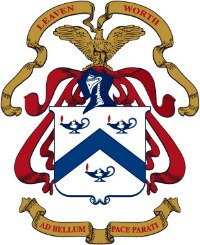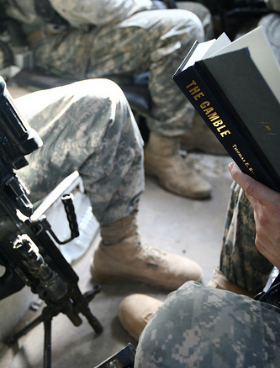Thomas E. Ricks's Blog, page 231
September 22, 2011
Republican solon blasts Bush Admin.'s 'power grab' in handling of JAGs, applauds Obama's Admin.'s fixes

No one seemed to notice it, but this comment, made by Sen.
Lindsey Graham during Sen. Webb's Sept. 14 hearing on bloat
in the general officer corps, is especially interesting because it comes
from a conservative South Carolina Republican who is also an Air Force Reserve
JAG officer:
SEN. GRAHAM: ...one thing I would say, in my little area of
the world, is that a two-star judge advocate general position did not serve us
well during Abu Ghraib and Guantanamo Bay discussions. Because there's a real
tension, and this is -- goes beyond party politics -- between the office of the
general counsel, who serves the secretary of Defense, and each service chief. They're
civilians. And the military uniformed lawyer, loyalty lies to their commander.
And we had a very bad problem in the Bush Administration
that the Obama Administration, quite frankly, has corrected. The civilian
lawyers in the Bush Administration, in my view, shut out military legal advice
and tried to make a power grab, saying that the judge advocate general had to
clean -- clear their legal advice to their commanders through the civilian
office of general counsel. That, to me, was an exercise of control of legal
independence.
Is it time for a military journal or law review to step up
and do an in-depth look at the Bush Administration vs. the JAGs? (If you know
of such an overview and analysis, please let me know.)
My personal theory, based on some interviews I did at the
time with JAGs, is that they became the first line of defense against the use
of torture and other Bush Administration transgressions because they were
"double professionals," heedful of their dual duties both as officers and as lawyers.
This made them more likely to refuse to break the law or tell others to do so.
September 21, 2011
Annals of sucky deployments: The life of a major marooned in southern Iraq

Army Maj. Jayson Stewart summarizes
his 2008 tour of duty as an advisor to a unit of the Iraqi border patrol that
actually was based more than 40 miles away from him. "There was a period there
where I didn't get out for four months, and I was only able to entice them to
come and see me probably once every two to three weeks."
I see this maybe as a Tom Hanks
movie. Or John Candy, if he were still with us.
I hope that nobody else has to go
through that same experience, because it did suck. I was able to build my own
little stadium seating inside one of the more concrete rooms and turned one of
my Armed Forces Network receivers and hooked it up to the one-eyed monster and
put it on a seven-foot by eight-foot screen and was able to watch football,
because I couldn't go anywhere and I couldn't do anything.
I think that fits my definition of
hell: Isolated in southern Iraq with nothing to do and a year to do it in.
Staff college now or war college later?: Our FSO civilian arrives at his decision

The Foreign Service Officer who
asked for advice on whether to go to a military staff college or to wait for a
war college has decided to go to staff college. Here he explains why:
The answers favoring the staff colleges make the most sense
for FSO's looking to work the pol-mil area, as well as the POLAD jobs. An FSO
who has the staff college experience would stand a better chance of
contributing and fitting in at a command or HQ.
War colleges would seem to be more about networking and exposure to
intra-agency topics. FSO's get a lot of that stuff through OJT. Also, in some
ways they would not be able to use what they learned at a WC since there's
still lots of layers of decision-making and authority above them. They'd be
able to better describe and explain the foreign policy process, but that's
about it.
I know that I would have had a more productive and meaningful work experience
in Iraq if I'd had the staff college experience. I'm pretty sure that lots of
military staff officers scratched their heads after leaving meetings with State
Department officers. FSO's as a group are held to the loosest and vaguest of
standards when it comes to staff work or planning. In fact, I would make the
case that ambiguity and keeping all options available is what the State
Department is all about, while the military is all about "right now"
taking precedence over "right". I remember one meeting where the O-6's
brightened whenever any civilian made a declarative statement or promised a
deliverable.
Since I expect to have sand in my mid-future, I'm thinking the staff college
would be a better use of my near-future time. I'll try to sort out the WC
eligibility issue at a later date.
Pakistan soon will have more nuclear warheads than it does American troops

So observes my CNAS colleague Patrick Cronin, reacting to the AP's report
that the U.S. government has agreed to limit its military presence in Pakistan
to between 100 and 150 troops.
The wars and the beer commercials

While I was on
August break trying to finish writing my book, Greg Jaffe, one of the most
thoughtful defense reporters going, had a fine
article that looked at the "patriotic''commericals that use our sentiments
about soldiers to peddle beer. The article is rather discursive, but captures
well the gap between today's new combat vets and the other 99 percent of
society. I liked especially that Jaffe went to the creator of one of the ads
and reported the guy's thinking.
In a related
piece, Chief Red Bull offers some useful thoughts on the
do's and don'ts of greeting homecoming soldiers.
September 20, 2011
The seven steps of American officials dealing with the puzzles of Pakistan

By Tom Lynch
Best Defense department of
dysfunctional diplomacy
Recent
comments
by Senator Kirk from Illinois exemplify a familiar pattern by senior
U.S. political, military and diplomatic officials struggling to understand
the devilish intricacies and deep challenges of South Asian politics
through the constrained access portal of experience in or focus on Afghanistan.
This struggle all too frequently takes
the pattern of a seven-step process of "discovery learning"
regarding the complexities of South Asia security by Americans first introduced
to Afghanistan without background in the wider region. That process goes
something like this ....
STEP
1 - MEET Afghans, find them engaging, look for the quick way to help them with
a "hand up," ignore the vexing, decades-long regional security
dilemmas underpinning their plight.
STEP
2 - DISCOVER Afghans suffer from multiple internal and external challenges --
take the (northern) Afghan viewpoint that theirs is all a problem of
Pakistan's making.
STEP
3 - BLAME Pakistan for all Afghanistan's ills and despair of American engagement
with Pakistan or Afghanistan, throw out the "I" word suggesting that
more India in Afghanistan would "teach" Pakistan a lesson (and
presumably save some cash).
STEP
4 - DISCOVER Pakistan already believes there is an Indian under every rock in
Afghanistan - and that threatening a quicker Coalition departure and greater
Indian involvement won't faze Pakistan.... Rawalpindi will move more quickly to
bolster its Afghan Taliban allies for a proxy war.
STEP
5 - DETERMINE that India isn't really interested in bailing out the Coalition
(or American politicians and diplomats) on western terms, has
its own regional objectives and timetables, and isn't
much responsive to boisterous American rhetoric accelerating the
timelines on a Pakistan-India proxy war in Afghanistan. That proxy war may
come, but India will work to prolong its onset as long as possible.
STEP
6 - RECOGNIZE that a rapidly-accelerating proxy war between two nuclear-armed
nations encouraged by a precipitous withdrawal of US/Coalition forces before
some political mechanism in place to limit the possibilities for that
war is irresponsible, an approach that is all too similar to America's
walk away from Afghanistan and Pakistan back the early 1990s that led to a
proxy war in Afghanistan between India and Pakistan before both
were fully tested nuclear-armed states.
STEP
7 - RESOLVE either to remain engaged with Afghanistan, Pakistan and
India for a lengthy and challenging diplomatic-military process (including some
level of non-trivial economic and military aid to both Afghanistan and Pakistan
for some time); or, SUCCUMB to the personal frustrations of it all
and quit the field, making room for the next nouveau American to start
the process at STEP 1.
Tom Lynch is a
research fellow for South Asia & Near East at NDU. A retired Army
Colonel, he was a special assistant focused on South Asian security for
the CENTCOM Commander and later the Chairman of the Joint Chiefs of
Staff during 2004-2010. The opinions here are his own.
Has there been flag bloat in the Navy and Air Force over the last decade while the Army needs more officers?

From testimony by Benjamin Freeman of the Project on
Government Oversight to Sen. Webb's personnel subcommittee of the Senate Armed
Services Committee on Sept. 14:
The Army and Marines, which bear the greatest burden in the
war on terror, have added far fewer top brass than the Navy and the Air Force. In
fact, the Navy and the Air Force have each added more top brass than the Army
and Marines combined. And the Navy and the Air Force added this top brass while
cutting more than 70,000 enlisted personnel and lower-ranking officers. Furthermore,
the Air Force has a historically low number of planes per general, and the Navy
is close to having more admirals than ships for them to command.
Meanwhile, retired Army Lt. Gen. James Dubik, one of the
most thoughtful officers I've met, argues on Sydney Freedberg's blog that
the Army, rather
than shrink, actually needs more officers: "The army has too few leaders,
and the methodology to determining the leader-to-led ration is outdated. Over
the past few years, there have been several leader-intensive requirements.
First, making all the staffs 24/7 capable. They are not so staffed in
peacetime. Second, staffing all the joint and multinational headquarters-and
not just in Iraq and Afghanistan but also elsewhere around the world. Third,
expanding the size of the special operating forces. And last, creating all the
train, equip, mentor activities."
Wall Street experts can tell you how the rich are making out like bandits while many Americans are getting poorer

I've been surprised at how
many of the little grasshoppers think it is just fine that our upward-redistributionist
tax policies are enabling the
super-rich to take an increasingly disproportionate share of wealth from
the U.S. system. Anyone who isn't bothered by the current extreme income
inequality in this country needs to read the new piece by my friend Timothy
Noah in the New Republic on the subject. Noah's an expert on the
subject, but the most striking part of the column is the
quotes he collects from investment bankers. To wit:
Michael
Cembalest, the chief investment officer of JPMorgan Chase, wrote in July of
this year . . . . that "profit margins have reached levels not seen in
decades," and "reductions in wages and benefits explain the majority of the net
improvement." . . . "US labor compensation," he explained, "is now at a 50-year
low relative to both company sales and US GDP."
. . .
"The upper classes of this country raped this country" is one of the more
polite things that Morgan Stanley money manager Steve Eisman has to say on the
eve of the 2008 sub-prime fiasco.
. . . "We
now have a Gini index similar to the Philippines and Mexico," a Proctor &
Gamble vice president told The
Wall Street Journal earlier this month, referring to a measure of
income distribution.
And it isn't like Tim is cherry-picking The Wall Street
Journal (where I labored for 17 years, btw, back before the newspaper was
taken over by alien
beings.)
You can find this stuff almost as random, as I did with this weekend column by
Al Lewis that I read over my eggs in a diner last Sunday: "median household
income is 7.1% lower than it was in 1999. . . . The clear trend-even before the
recession began-is that more Americans are getting poorer."
I remember reading somewhere that Argentina
was the first nation ever to move from the First World to the Third World. We
should heed that example.
September 19, 2011
Some new military reading lists make me wonder: Can today's top generals keep up with today's corporals?

As longtime little grasshoppers
know, I'm
a fan
of reading
lists. Here is one
from former Army chief of staff Gen. Martin Dempsey -- where is he now? Here is
another
from a Marine sergeant major. I actually prefer the Marine's, which has
less pop journalism and more history.
And here is Exum's
response to Dempsey's. It also is a much better list than the official one.
(And here is Exum's short list of essential
reading to help one understand the war in Afghanistan. While I'm at it,
here is a roundup from The Economist of new books on the war on terror.)
Here
Greg Jaffe reviews the bidding, noting that, "The problem, it seems, is
that Dempsey's tastes run toward the middle brow."
There is an interesting pattern
here: The less rank one has, the more intellectually rigorous the list? Put
another way: Are our generals keeping up with our corporals?
My friend Frank Hoffman comments
on the Army list:
One might not want to look too deep into this list, as they
are usually the product of a committee, but I am sure that General Dempsey
personally edited the list a bit. Was good to see that he included one book on
Civil-mil relations, although I've not read the Schofield text. The Army has
several good books by Nielson and Snider to use but they might be not
considered as classics. Notably, HR McMaster's book is NOT listed, nor Eliot
Cohen or Bacevich.
Was surprised at the two Friedman books, a bit optimistic
about collaboration for an institutional worldview of Persistent Conflict, and
I think that Lawrence Freedman and Aaron Friedberg and Fareed Zakaria's Post-American World are a
bit more up to date. For senior officers, Colin Gray's Another Bloody Century might
be useful. But the list is well balanced off with the Ramos book and Bob Kaplan's
look at Asia. Kaplan's Imperial
Grunts would have been far more relevant to the Army. The Seb
Junger book on Afghanistan helps the loss there.
Military
strategy items are a bit thin (yes, I do see the required nods to Karl von C
and his Chinese alter ego), this is longer on business books than traditional
lists. I can live without Gladwell, as Outliers is his worst book but
the underlying message of hard work is not without merit. The Moten book
is very useful at least for war termination but actually more on
policy-strategy interface. Colin Gray's pithy Fighting Talk on strategic maxims could have be
leveraged better to fill the strategy hole.
How many dissidents has Wikileaks fingered for Third World despots?

That might be the question a year
from now, as Third World dictators arrest those identified in diplomatic cables
as talking to representatives of the U.S. government. See Joshua Keating's
of the state of play. He notes that two Zimbabwean generals and an Ethiopian
journalist already are in the hot seat.
So yeah, I think Wikileaks has
been wildly irresponsible. And people who helped it should probably be ashamed
of themselves. Maybe tithe 10 percent of your income to Amnesty International
as penance.
Thomas E. Ricks's Blog
- Thomas E. Ricks's profile
- 436 followers



